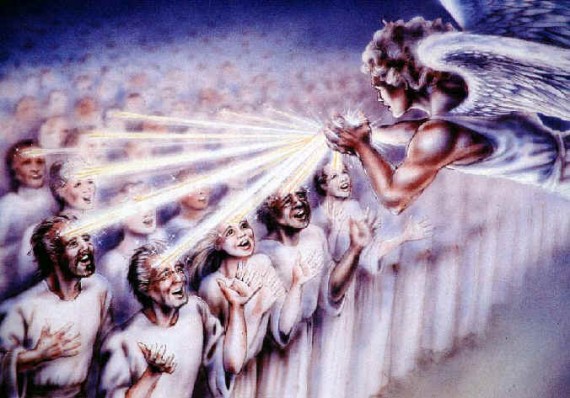 Maybe I haven’t studied eschatology (the study of the End Times) as much as I should have, or maybe I just don’t care about it too much (the world has enough problems today for me to worry about the problems in the future), but as I read The Theology of the Book of Revelation
Maybe I haven’t studied eschatology (the study of the End Times) as much as I should have, or maybe I just don’t care about it too much (the world has enough problems today for me to worry about the problems in the future), but as I read The Theology of the Book of Revelation, which presents a Preterist reading of Revelation, I just find myself shrugging, and saying, “I don’t really care if he is right or wrong, this way of understanding Revelation makes it much more teachable and applicable.”
Is that bad?
I have never taught through the Book of Revelation, and frankly, until I started reading this book, I never really wanted to. Why not? Well, I like science fiction, and I like Scripture, but I don’t like Scripture to sound like science fiction. And for me, that is how the book of Revelation usually sounded.
But Bauckham’s way of reading Revelation actually excites me. It seems to bring the book of Revelation into real life.
This week, those of us who are reading the book (see the list below), read chapters 3-4. Here is some of what these chapters contained.
The Lamb on the Throne
I was a bit confused initially with chapter 3, since it seemed to have absolutely nothing to do with Preterism. Instead, it dealt with how Revelation reveals John’s belief that Jesus was divine and therefore, worthy of Christian worship. It is a great point, and a definite theme in all of John’s writings, but what does it have to do with Preterism?
Then I remembered that Richard Bauckham’s book is not actually about Preterism, but is about The Theology of the Book of Revelation. That is, after all, its title. One of the central themes in the book is that Jesus is God, and is therefore worthy of our worship. It’s a great point, and well defended in chapter 3. But chapter 4 is where the book really began to deal with the Preteristic view of Revelation.
The Victory of the Lamb and His Followers
In chapter 4, Bauckham deals with several of the key images in Revelation, and argues that they do not predict a future tribulation where 144,000 Jewish witnesses and 2 Martyred Prophets fight against a One World Ruler and a One World Religion until God kills everybody in a bloodbath at the battle of Armageddon. Instead, Bauckham interprets most of the imagery in Revelation according to three main themes.
The Messianic War
Though the Jews wanted Jesus to be a conquering king, He lived and died as a suffering servant. But through suffering and dying, Jesus defeated evil anyway. Buackham argues that in the Book of Revelation that this is the same way the Messianic war against evil continues (pp. 67-70). It is through suffering, service, and death that victory over evil is won. This image is prevalent in Revelation through the death of the Lamb (pp. 73-76), and the army of 144,000 (p. 77).

The Eschatological Exodus
The idea of Exodus is a key theme throughout the entire Bible. Exodus occurs when we leave the kingdom of darkness where there is slavery and suffering, and are brought into the kingdom of light where there is freedom and joy. Bauckham argues that this theme is prevalent in Revelation (pp. 71-72).
Martyrs and a Witness
Just as Jesus was a witness to the truth, and suffered and died as a result, so also, we who follow Jesus are also to witness to the truth, knowing that if we do, we also may suffer and die as a result. But just as God raised Jesus from the dead, and glorified Him, so also will God give praise, honor, and glory to those who suffer for the truth (pp. 72-73). The 144,000 witnesses represent this, as also do the two witnesses in Revelation 11 (pp. 76-80, 84-88).
Positive Reading
In many ways, I find this way of reading Revelation inspiring. It shows us that the message of Revelation is not just for future people living in some period of terrible times on planet earth, but is a message for us today as well, to live lives of peace, mercy, justice, and self-sacrifice, as this way of life follows the example of Jesus, and His instructions for carrying out God’s will on earth, as it is in heaven.
However, there are some ideas I was uncomfortable with as well.
Problematic Reading
There are definitely some problems with Bauckham’s reading. For example, it seems a stretch to transform all the killing and slaughter of humans that takes place in the book, into some sort of peaceful resistance movement. I’m not fond of all the dying either, but I am not sure we can just make it go away by spiritualizing this so that it refers to the destruction of the political, economic, and religious systems which God opposes (p. 102).
 Bauckham does the same thing with the Millennium, basically saying that it is only an encouraging image which reveals that eventually, the martyrs will universally rule the earth (p. 107). Personally, if this is all that God is promising, it is too vague to be inspiring.
Bauckham does the same thing with the Millennium, basically saying that it is only an encouraging image which reveals that eventually, the martyrs will universally rule the earth (p. 107). Personally, if this is all that God is promising, it is too vague to be inspiring.
I look forward to reading chapters 5-6 next week. For now, here are posts by others are who writing about chapters 3-4 in The Theology of the Book of Revelation. If you have read the book, and are writing about it online, let me know in the comments section below, and I will add you to the list!
- Anthony Ehrhardt
- Peter Bowyer




Hi Jeremy, are you promoting preterism?
Interesting reading. I particularly liked the part where you seemed to imply that Revelation was like science fiction, and where you talk about Bauckham saying that it is only an encouraging image. Science fiction, of course is made up stuff, usually to make a point. Revelation falls in that category – made up stuff to make a point. Bauckham seems to understand this when he calls it an image, rather than reality or truth. The sooner we get over the idea that Revelation is true, we can enjoy its religious famcies in same way we enjoy the religious fancies of Frank Herbert’s Dune.
Terry, No. Just reading a book about it.
Jeremy, do I understand correctly that you are saying that the Revelation is not true?
Jeremy, okay, so now I see that you are quoting the comment of Harold Shuckhart, but why?
I am not actually quoting him. I have a plugin on my WordPress blog that integrates comments from Facebook onto my blog, and from by blog to Facebook. So he made a comment on my blog, and it got posted here to my Facebook page. If you go look at the post https://redeeminggod.com/revelation-144000-millennium/ you will see that your two comment here got posted there, as well as my two comments. It is just a way to encourage more interaction. One drawback, as you have seen, is that it looks like I am quoting the person when in fact I am not.
Good morning Harold, I found both your comments and that of Jeremy interesting as it fits in with what jesus said about parables in Matthew Chapter 13 v 11 to 17, I’m not having a go at you I’m just trying to give an explanation as to what we as humans do when we don’t understand something, we either ignore it and call it rubbish or we rubbish it and kill it.
Our pride, which comes from the evil one, will not allow us to accept the fact that we are not in a heart relationship with God but a head relationship.
Isaiah 55 on first viewing looks a bit complicated but it’s all about our relationship with God. We can never aspire to really understand God so we have to accept what he says without understanding, is that blind faith, no, it shows our willingness to totally surrender ourselves to Him in body, mind and soul for something better.
If we have not died to self then there is no way we can possibly receive all there is from God as the self life in us will not allow it to happen. Does that mean we have to dump our brains and our intellect at the door of his Kingdom, no as we will need that to understand what He will reveal to us as He revealed it to His Apostles in Matthew 13.
Daniel interpreted dreams but John had a vision, both contained metaphors, allegory and were symbolic of future events and not to be taken literally. Why not say it as it will be? I don’t know but I suspect our finite minds could not comprehend it. I don’t know how you both interpret the creation in Genesis, are you believers that it was a literal 6 days, or 6 periods of time say of a million years. Were Adam and Eve the only people about or were they specifically chosen to be the forerunner of Gods plan to overcome Lucifers flawed plan. Does it matter, well it does if you cant get past Genesis in reading His word. Sometimes, just like revelation, the literal explanation would be beyond our understanding, so, “get over it” as they say in todays colloquia.
I have a dear brother at Church who is a professor who still goes into university at the age of 70 to help out the students. When it comes to his faith, thats something else, he believes but still struggles with unbelief and in some ways cant wait to have it all explained to him. I admire him as his struggle is far greater than mine.
Since God revealed Himself to me when I was in the pit 30 years ago I have never questioned if there is a God or not and have never questioned the validity of Jesus as his son and the power of the Holy Spirit that lives within me. The only thing I have ever struggled with is that God should put this power in me to love the unloved to perform miracles and raise the dead. Sometimes I see my fumbling prayers answered with a miracle, and I’m always amazed, as yet I have not been involved in praying for the dead to come back to life.
I to am 70 years old next July and the past 30 years have been the best in my life.
When we used to play the old 78rpm records they would sometimes get a scratch and the needle would get stuck, we would lift it up and move it on to hear the remainder of the song. May all those that read these thoughts, yours and others, be willing to let God lift us when we get stuck and move us on to even greater and more wonderful things, because as more is revealed the unanswered questions will get answered through fresh revelation of His word to our minds and into our hearts. As when we smell fresh bread as its drawn from the oven.
Your brother in Christ Clive
Clive,
Thank you for the encouraging comment, and thank you for living a life of faithfulness for these past 30 years, as a witness to those of us who follow behind.
Clive, on the one hand, you are correct. Faith requires a total commitment to that which cannot be proven. On the other hand, by taking that position, you throw away what a believer should think is God’s greatest gift – the ability to think. By simply accepting religion, Jesus, God, Satan, and all the rest of the myth as true without question, you must be a disappointment to God. “Oh, my, He must be saying, why don’t they use the brains I gave them?”
I have used my brain to study religions in general and Christianity in particular and found them to have one outstanding thing in common – they were all invented by humans. I am sure you agree with me on this to about 99.7% as I am sure you believe 99.7% of the religions, the religions other than your own, are false and human created. I go one step beyond that position, and believe they ALL are false and human created. You are 99.7% atheist and I am 100%.
You are probably sputtering something about your religion being the true religion. Okay, here is a challenge for you. Take any other religion, say, the Druids, or the classical Greeks, for examples. What it is that makes you think they are false religions. Make a list of the contradictions and things you consider false. NOW can your religion pass those same tests? Are you even willing to ask those questions of your religion?
PBUY
Harold,
These are good questions to ask. I have tried to ask them. Maybe not as well as I could have or should have.
I somewhat asked and tried to answer this question in my post Is Christianity True?
I stated there that one of the main reasons I hold to Christianity is grace. The full and free grace of God is not something I think that man would have or could have invented.
All manmade religions believe that to get “right with God” we need to “do something.” But the thing that makes Christianity unique, and therefore (in my opinion) truly from God, is His revelation to us in Jesus Christ that we don’t have to “do” anything. He did it all for us in the life, death, and resurrection of Jesus.
Really? Are you a Preterist?
Dave,
No. I am not. I’m reading a book about it though.